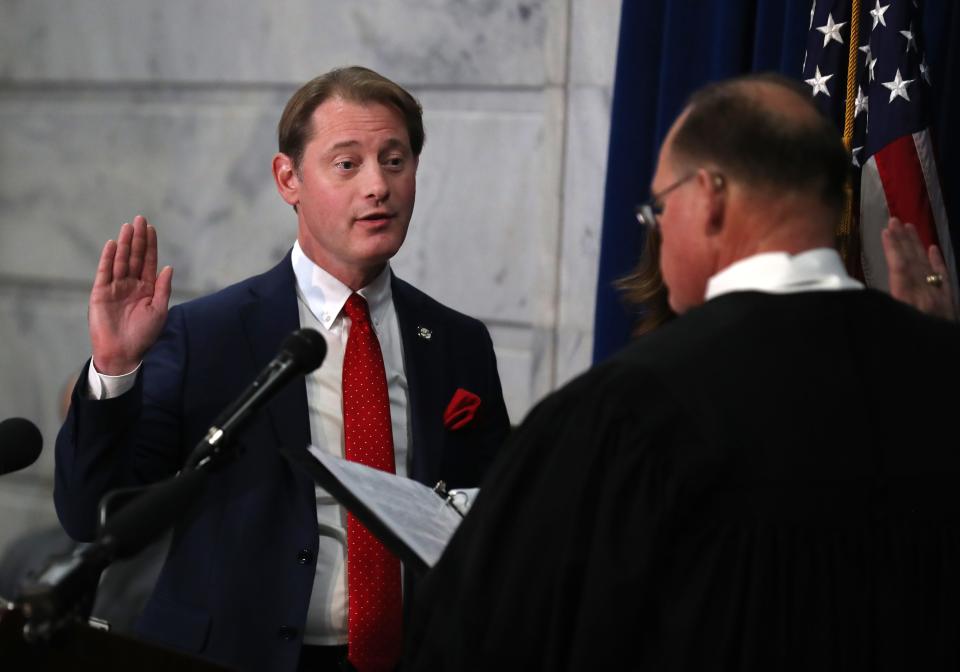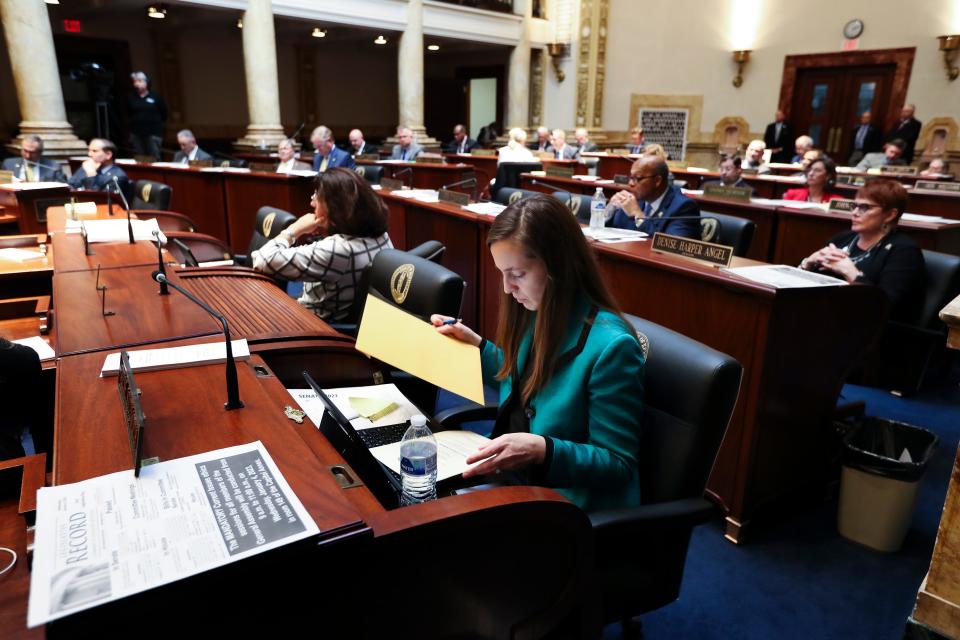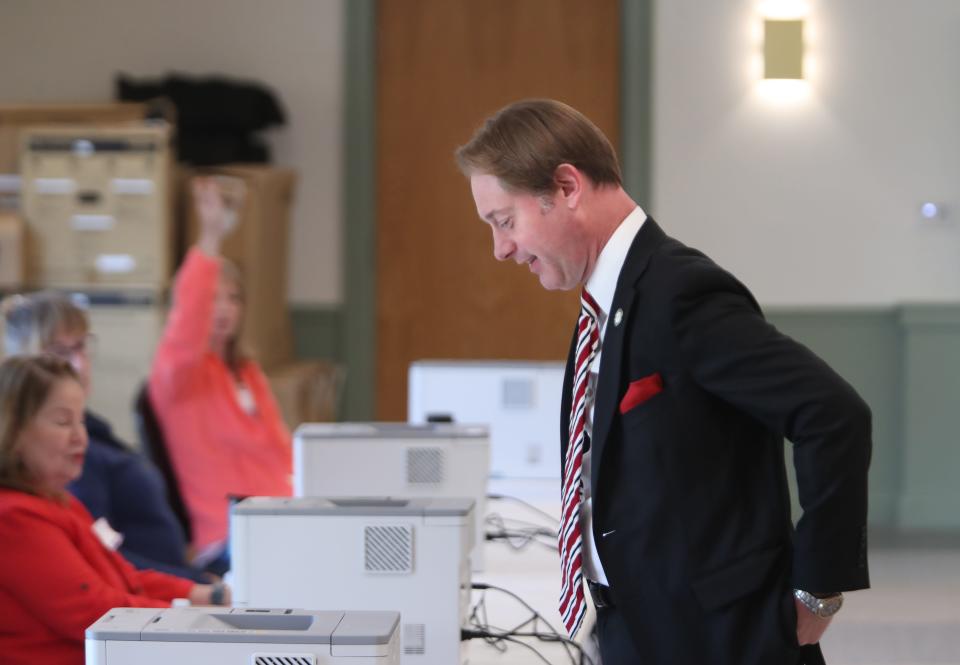'Dumb stuff': Michael Adams fears election bills will make 'national mockery' of Kentucky
- Oops!Something went wrong.Please try again later.
FRANKFORT — Secretary of State Michael Adams isn’t opposed to every election reform bill that’s been filed in the 2024 General Assembly. A measure tweaking the Kentucky’s post-election audits has his support, for instance.
But the Paducah native said he is “very sensitive to our image as a state.” And after Kentucky drew national praise during his first term for opening up voting access amid the COVID-19 pandemic, he’s wary of several proposals he views as steps in the wrong direction.
“I’m happy that the governor and legislature have worked together on business recruitment and trying to get new jobs here, and every time we do something stupid and folks outside of our state who are thinking of moving here or visiting here see that kind of stuff, it makes it less likely to happen,” he said on Jan. 18. “The only way we’re going to keep that kind of progress of lowering taxes and attracting businesses is if we don’t punch ourselves in the eye with dumb stuff like that.”

Adams made it clear he's keeping tabs on several proposals pending in Frankfort that would alter Kentucky’s elections.
There’s Senate Bill 61, a measure from Sen. John Schickel of Union and six other Republican co-sponsors that would eliminate three days of early voting and require all no-excuse in-person voting to take place on Election Day. His position isn’t based on potential fraud or the finances behind keeping the polls open — instead, he’s told colleagues, it’s about taking action against “those who say we should worship at the altar of convenience and casualness.”
Schickel, a former precinct officer serving his final term in office, has acknowledged on the Senate floor his position is “in disagreement with our governor, it’s in disagreement with my friend the secretary of state, and it’s probably in disagreement with many of those in this chamber.” But Election Day was created by Congress to be “a special day when all Americans would come and vote … and Election Day was established to be special. Not something to be taken casually or as an afterthought.”
“There are folks who would argue that microwave cooking improved the family meal,” he said in a Jan. 17 speech to senators. “… Many of us old folks would say it hasn’t improved the family meal at all — in fact, it may have been the demise of the family meal.
"The reason I bring it up is all studies show that the family meal is the most important thing a family does. I know that’s where I learned most of my family values as a young child. The same is true with voting. … When you make something less special, it becomes less special.”
Adams — architect of the 2020 deal to expand early voting in Kentucky with three additional days of access — does not share Schickel’s opinion.
Like most states, he said, Kentucky’s voter turnout is higher when a presidential race is on the ballot, which will be the case this November. And he stays in tune with the national conversation.
“It would be disastrous to try to take away three of our four voting days going into an election with expected turnout in the millions,” Adams said. “And it would also just be a bad look for our state. We would be the subject of boycotts, national mockery — ‘Look at Kentucky, they had four days to vote but now they just have one. What’s going on down there?’”
There are also a string of proposals put forward by Sen. Adrienne Southworth, R-Lawrenceburg, that would spark several changes to the state's election laws.

She's a supporter of SB 61. Speaking last week, Southworth told reporters Schickel's bill would save the state and counties money by only requiring one day of full staffing at polling locations, and people who have an excuse that would keep them from voting on Election Day are already covered by absentee ballots.
"I think the benefit of not having early voting is much higher than the benefit of having it," she said.
Her proposals would take it further.
Senate Bill 77 would require a voting tally after Election Day. SB 78 would require all voting system equipment be produced in the U.S. SB 79 revises recount procedures. SB 82 would make additional amendments to the process, while SB 83 would cut straight-party voting as an option on ballots and SB 84 would initiate a risk-limiting audit at each polling location once polls are closed to certify election results.
Each of those bills has been assigned to the Senate State & Local Government Committee, where they'll either be brought up for discussion or die without action. But her Senate Bill 80 has seen more traction — that proposal, to eliminate student IDs as an eligible form of primary voter ID and eliminate credit and debit cards as an eligible secondary voting ID, was recommended for approval by committee Republicans last week and passed Tuesday on the Senate floor, despite concerns from Democrats it would make it harder for young people to vote.
Southworth's skeptical stance on election security has drawn criticism from Adams before, along with other Republicans. She toured the state in 2022 touting unsubstantiated claims of voter fraud in Kentucky elections and was rebuked in the Senate multiple times that year by Majority Floor Leader Damon Thayer, R-Georgetown, for spreading points about election security based on what he called "complete myth."
Thayer supports SB 80. But Adams has expressed concern, saying it could get current photo ID law struck down in court and alienate young voters by making it harder to vote. And he was critical of the other bills proposed by Southworth — she files them each year, he said, and there's a reason the General Assembly never takes them up.
"I’m actually pleasantly surprised that there isn’t more support for measures like these," he said. "It’s one fringe legislator who’s been a repeat customer on this stuff."
A separate GOP proposal, House Bill 341, would leave it to voters to determine whether individuals who are not U.S. citizens should be eligible to vote in Kentucky. It was approved Tuesday in the House despite concerns raised by Democrats.
Still, Kentucky's constitution currently only gives the privilege to vote to "every citizen of the United States of the age of eighteen years who has resided in the state one year, and in the county six months, and in the precinct in which he offers to vote sixty days next preceding the election."
Adams has told lawmakers he hopes they use their time in Frankfort to tweak election funding for counties to ensure it's in line with the number of registered voters instead of precincts, which may not be open on Election Day — he cited a case in Carroll County where officials were given enough funding to allow 11 precincts but eventually offered just one voting location — and to give him more authority to seek access to voter information from other states to keep Kentucky's voter roll clean.

And he publicly supports at least one proposal concerning Kentucky's elections — House Bill 53, from Rep. John Hodgson, R-Fisherville, which would replace the risk-limiting audit system used to confirm the results of the 2022 election with a public hand-to-eye recount of one race on one randomly selected ballot scanner in each of the state's 120 counties. Machines are tested before Election Day to confirm their accuracy, Hodgson noted, but his goal is to "trust, but verify."
"As long as elections confer power and money, there are going to be people with a motive to cheat, and our job is to find a way to catch them if they do cheat," Hodgson said after his bill won committee approval two weeks ago. "... We test these machines up front to make sure they're being accurate, but right now we don't have a good test on the back end to make sure they continue to be correct."
Adams, who called a series of longshot election challenges "frivolous" after they were filed following the 2022 primary, is in his corner.
"It’s important to have a procedure after an election where you prove that the vote counting was accurate, and it’s not ideal to do it the way it was done in 2022, when we had people who ran in primaries and lost by huge margins sue election officials and demand that recounts be conducted in noncompetitive races," he said. "... When you randomize it you make it fair, and when you make it universal you also strengthen the case that this isn’t, ‘OK sure, this county gets it right, but what about this county?’ You prove that every single county is actually getting it right."
One other election bill has already won approval in one chamber — Senate Bill 10, from Sen. Chris McDaniel, R-Ryland Heights, a proposal he's backed before which would push elections for statewide offices back a year to be held in the same year as presidential elections. Winners of the 2027 elections would serve one five-year term if the bill is passed in the General Assembly and then approved by Kentucky voters.
Adams, who won reelection last November with more votes than any other candidate on the ballot, and his office are remaining neutral on SB 10, as is custom with bills that don't affect voter access or the mechanics of the state's elections. That one, he said, is all up to the General Assembly.
"This is typically an issue where the House and Senate have disagreed — and I’ve got to get along with both of them, so let them fight that out themselves," he said.
Reach Lucas Aulbach at laulbach@courier-journal.com.
This article originally appeared on Louisville Courier Journal: Kentucky legislature's election bills draw concern from Michael Adams

